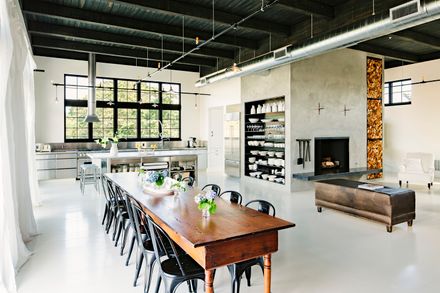Division Street Residence
MANUFACTURERS
Chicago Faucets, Marvin, Schoolhouse Electric, Subzero/wolf, Ventahood
YEAR
2012
LOCATION
Portland, United States
CATEGORY
Houses, Adaptive Reuse
Text description provided by architect.
This unique home is the poster child of adaptive reuse. Starting with a property that intermingled three buildings from different periods over the last century, Emerick Architects crafted a strategy to reuse the structure, adding a penthouse and a roof garden to create an urban oasis and a highly energy-efficient home.
Marrying practicality with craftsmanship, almost everything for the project was handmade locally by Portland artisans including cabinetry, steel work, railings, doors, stairs, light fixtures, and plaster.
Relocated from New York, the clients wanted a dwelling inspired by the authenticity and rawness of commercial buildings combined with the warmth and beauty of an elegantly crafted custom home.
The context of their chosen neighborhood—mixed-income and use, small-scale streets, and an existing blend of commercial and residential—was the perfect backdrop for this building and a city planner’s goal of denser living.
The project started with a dilapidated 1920’s warehouse occupying a quarter block. The concept that emerged was to recycle this base building into a fortress-like box supporting an airy and contemporary penthouse above.
While this allowed for privacy, garden space, and expansive views for the residents, it also introduced a fascinating tension to the project through contrast.
This became an organizing element in the design and is central to every part of the experience.
Outside this is expressed through the creamy mass set over the charcoal bearing wall base.
Inside, the entry is a carefully choreographed experience that starts by penetrating the street wall and traveling through relative darkness deep into the building and concludes with a vertical light filled stair wrapping around a primitive factory elevator shaft.
This openness is balanced by the careful interplay of inserted elements. Key among these is the massive concrete hearth, placed just off center of the major square volume, anchoring and shaping the sense of interior space. Sustainability was instilled in the design from the ground up.
Starting with the adaptive reuse of an existing building—formerly once a corner grocery, printing press, mechanic’s shop—and ending with an expansive solar array mounted on the roof of the penthouse which enables the owners to receive money back from the electric company every month despite the luxury of modern conveniences like radiant floor heat.
Befitting an industrial structure, the second-story loft is lined with period appropriate 12-foot-high windows, custom-made to replicate 1930s steel-framed factory windows—albeit in more environmentally sound, insulated glass and wood system.
A wraparound terrace was created in response to a city setback requirement, providing outdoor space for the client and managing water runoff.
Equally surprising on a finer scale is the warmth and attention to detail conveyed through the industrial craftsmanship and choice of materials.
The original tarred wood roof deck was salvaged for the finished ceilings; raw steel was crafted for shelving; and exposed wiring became custom designed black iron lights.
Found fixtures and objects of the past punctuate the space—melding old with new, rough with elegant—and provide the final finishing touches for this warehouse-turned-home.














